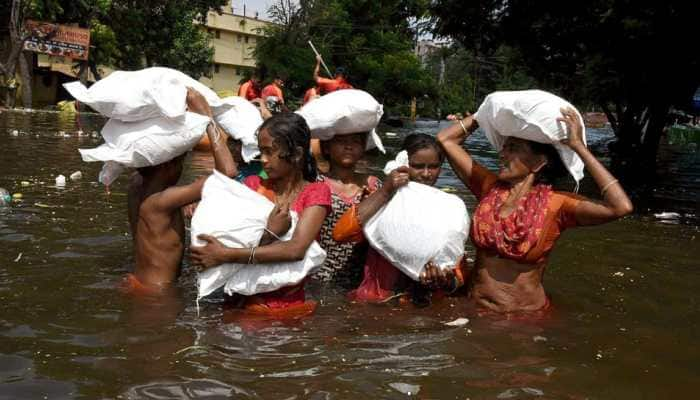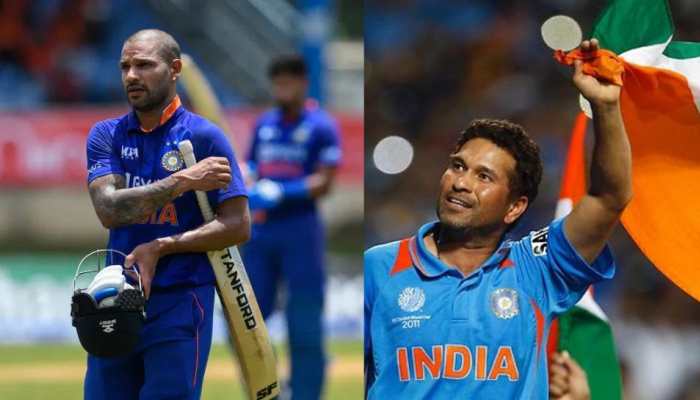Talk openly about menstruation, periods are not bad: Kareena Kapoor
Trending Photos
)
Ashok Kumar/OneWorld South Asia
Bollywood actress Kareena Kapoor and UNICEF Goodwill advocate Kareena Kapoor was in Lucknow to attend an event called 'Celebrating Menstrual Hygiene for all Girls, for all Women'. Kapoor talks to Ashok Kumar of OneWorld South Asia on topics like menstruation, sex education and social taboos. Excerpts from the interaction:
OneWorld South Asia: What kind of role can media including Bollywood play to change the mindset of not just girls but also the society on issues like menstruation?
Kareena Kapoor: Media should provide more space to news on such issues. Newspapers, magazines, websites should give more space to menstruation.
Films, too can talk about issues related to menstrual hygiene or other issues related to girls. Earlier people would not talk about menstruation. Earlier, when my mother was active in the film industry there were no separate toilets for women.
We have heard that girls had to use dust and ash. But things are changing now. Governments are distributing sanitary pads among girls. Men should come forward to support women during menstruation. Husbands and brothers should support women during menstruation.
OWSA: You belong to a very affluent family. Did you as a girl face any taboo while growing up?
Kapoor: The biggest taboo that I have faced is that in our family not many women were working. To continue working after marriage was taboo for our family. I think Karishma and I are the first of our family to continue working after marriage.
Many people warned me against marriage that I would lose my career. But I said I will get married and also continue working. Acting is in my blood and I will die working in a studio. I feel girls should explore a professional career.
(Bahut saare logon ne mujhe kaha ki shaadi mat karo, career khatam ho jayega, toh maine kaha ki mein shaadi karke dikhaongi aur main kaam bhi karoongi. Main end tak studio mein hi maroongi kyunki yeh mere khoon mein hai. Ladkiyon ko kaam karna chahiye. Har aurat ko kaam karna chahiye.)
OWSA: How do you see women ushering in societal changes?
Kapoor: Wherever you see, women are there. I think they are replacing the men and it is nice to see that. Even in journalism you see a good amount of women coming forward.
My interaction with a bunch of girls in Rajasthan and Uttar Pradesh revealed that girls want to attend schools despite their periods. There should be no obstacles to girls’ education. We should respect the privacy of girls and provide them with separate toilets in schools.
OWSA: How can a common girl fight menstrual taboos?
Kapoor: I appeal to girls to talk openly about menstruation to the government and not behind closed doors. It is unfortunate that girls are not allowed to go to temple during periods.
God has made periods, therefore, periods are not bad. It makes me happy to see so many girls, like those associated with project Garima fighting off menstrual taboos.
Periods are natural. So, how can we say women are impure during their periods? Indian girls need to stand up against social taboos related to menstruation. It is shameful that girls are termed dirty or compelled to miss school during periods.
OWSA: How can stars like you make a difference?
Kapoor: I am personally attached to issues like child rights, women’s education and menstrual hygiene. I would continue to let my voice be heard through UNICEF.
As a star, I would like to make it clear that we too live a normal life like others. I just want to tell you that there are no portable toilets for stars. We also have to work in the same high temperatures, bear the same rough weather just like other people.
I want girls to look at stars like one among them. I am no different from any other girl. I am not the Prime Minister of India!
My voice on menstrual hygiene, sanitation has reached to girls of this country. I am travelling to many cities for the cause including Lucknow in Uttar Pradesh and Raipur in Madhya Pradesh. Efforts are on to ensure that stars are not visible on the big screen alone. If my voice has reached to Lucknow which is the core of India, I am sure it will also spread to the entire nation.
OWSA: How important is sex education or education on menstrual hygiene in Indian schools?
Kapoor: Well, I think menstrual hygiene is very important and we need to have this conversation with families, too. Girls should talk to parents about issues like menstrual hygiene. Generally, a lot of children feel little tensed or worried while talking about such issues with their parents. I think they should openly talk to them.
Be it about menstrual hygiene or sex education, children should put across their queries to teachers if they are at school or to their parents if they are at home. We can only progress by getting right kind of information at the right time.
Children have many questions, but there are not many around to answer those questions. I believe that since we are talking about such topics today, my voice is reaching to all of them and they are getting some kind of valid information.
The mindset of boys about menstrual hygiene or sexual education is very important for creating a positive atmosphere. The issue of menstruation is not just a girl’s problem, but even boys should be equally informed about menstrual hygiene. A husband, friend or brother should help a girl during her periods. Men should support women during menstruation.
Stay informed on all the latest news, real-time breaking news updates, and follow all the important headlines in india news and world News on Zee News.
Live Tv







)
)
)
)
)
)
)
)
)
)
